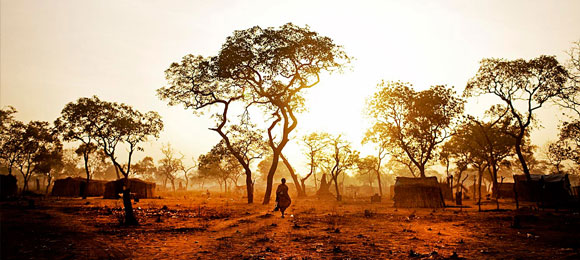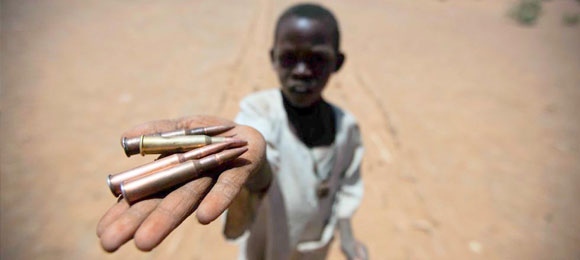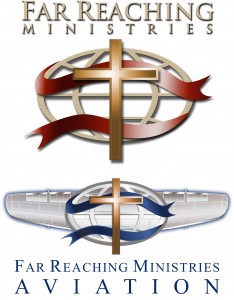
History & Overview
A Brief Description of South Sudan
Sudan gained its independence from Britain in 1956. Since then, it has been devastated by two civil wars. In July 1983, the second civil war erupted in Sudan. Two million people died in South Sudan as a result of that war, as well as the famine and disease that followed. An additional four million people were displaced. The Southern Sudanese people have suffered from decades of violence, injustice, terror, and poverty under the Government of Sudan (GoS) and a terrorist group known as the Lord’s Resistance Army (LRA). The GoS and LRA attacked and burned entire villages. They abducted children from their homes in the middle of the night, forcing some to kill their own siblings and parents—and paralyzed an entire country with fear. Countless innocent civilians were tortured, raped, disfigured, mutilated, and murdered based on their Christian or animist beliefs, as well as the color of their skin.
Across the border in Northern Uganda, innocent and defenseless civilians suffered from decades of violence, injustice, fear, and poverty by the same LRA terrorist group. This ultra-violent guerrilla group, led by Joseph Kony, targeted civilians by attacking, torturing, raping, disfiguring, mutilating, murdering, and even forcing some into prostitution. Kony preyed upon children, exploiting them as sex slaves and child soldiers.

The LRA’s abductions of children forced nearly two million Ugandans to live in squalor in Internally Displaced Persons (IDP) camps. IDP camps did not stop the abductions though. So, children began commuting nightly into the city centers. They would sleep huddled together in churches, schools, and even on the verandas of shops. That is when FRM established a project in the Kitgum District that erected night shelters, taught Bible studies for children, and cared for orphans.
In 2005, the Government of Southern Sudan (GoSS) began mediating peace talks between the LRA and the Ugandan government. Kony’s forces were assembled and isolated in the Congo. Although the peace talks failed to yield a permanent agreement, it did stop the LRA from terrorizing Northern Uganda. The night shelters were closed in 2006, and IDP camps shut down shortly thereafter. FRM continues to support the survivors through local community-based organizations. The LRA, although considerably smaller in size, is still reportedly crossing into South Sudan and Darfur, terrorizing and killing civilians, and abducting children.
The Sudan conflict officially ceased in January 2005, with the signing of a Comprehensive Peace Agreement (CPA). A six year interim period was mandated and for the first time oil revenues were allocated to the GoSS. The final phase of the CPA was a national election, whereby in January 2011 the people overwhelmingly voted for secession. On July 9, 2011, South Sudan was globally recognized as a new nation. In spite of peacekeeping troops, international monitoring, and sanctions being imposed on the GoS, the conflict continues to escalate in the Nuba Mountain, Blue Nile, Abyei, and Darfur regions, and has recently expanded back into Southern Sudan.
A Brief Description of FRM & FRMA
Far Reaching Ministries (FRM) and Far Reaching Ministries Aviation (FRMA) continue to focus on providing discipleship, followed by providing humanitarian resources relief. This includes providing education to the poor and persecuted people in various nations throughout the world. FRM’s mission is to carry the Gospel of Jesus Christ to the lost and dying of the world, with discipleship as the primary vehicle. Together, FRM and FRMA accomplishes this through evangelism, addressing audiences of all sizes (from evangelical crusades to one-on-one relationships), planting and establishing churches, as well as the founding Bible schools.
FRM and FRMA resources are similarly utilized to rescue and prevent the suffering and exploitation of vulnerable communities by assisting to rebuild lives after facing religious persecution, violence, ethnic cleansing, rape, abduction, torture, and humanitarian crises caused by civil war. FRM and FRMA serves the afflicted, the starving, those enslaved by human traffickers, the ill or dying by bringing aid for their physical needs, but most importantly, fulfilling their spiritual needs.
Including all field posts, FRM and FRMA currently operates in twenty-eight countries around the world. Field posts are managed and staffed by a small number of expatriate missionaries and/or pastors, and a large
number of national workers trained by FRM. In doing so, the scope and impact increases exponentially. All staff members are trained to train others and encouraged to “work themselves out of a job.”
